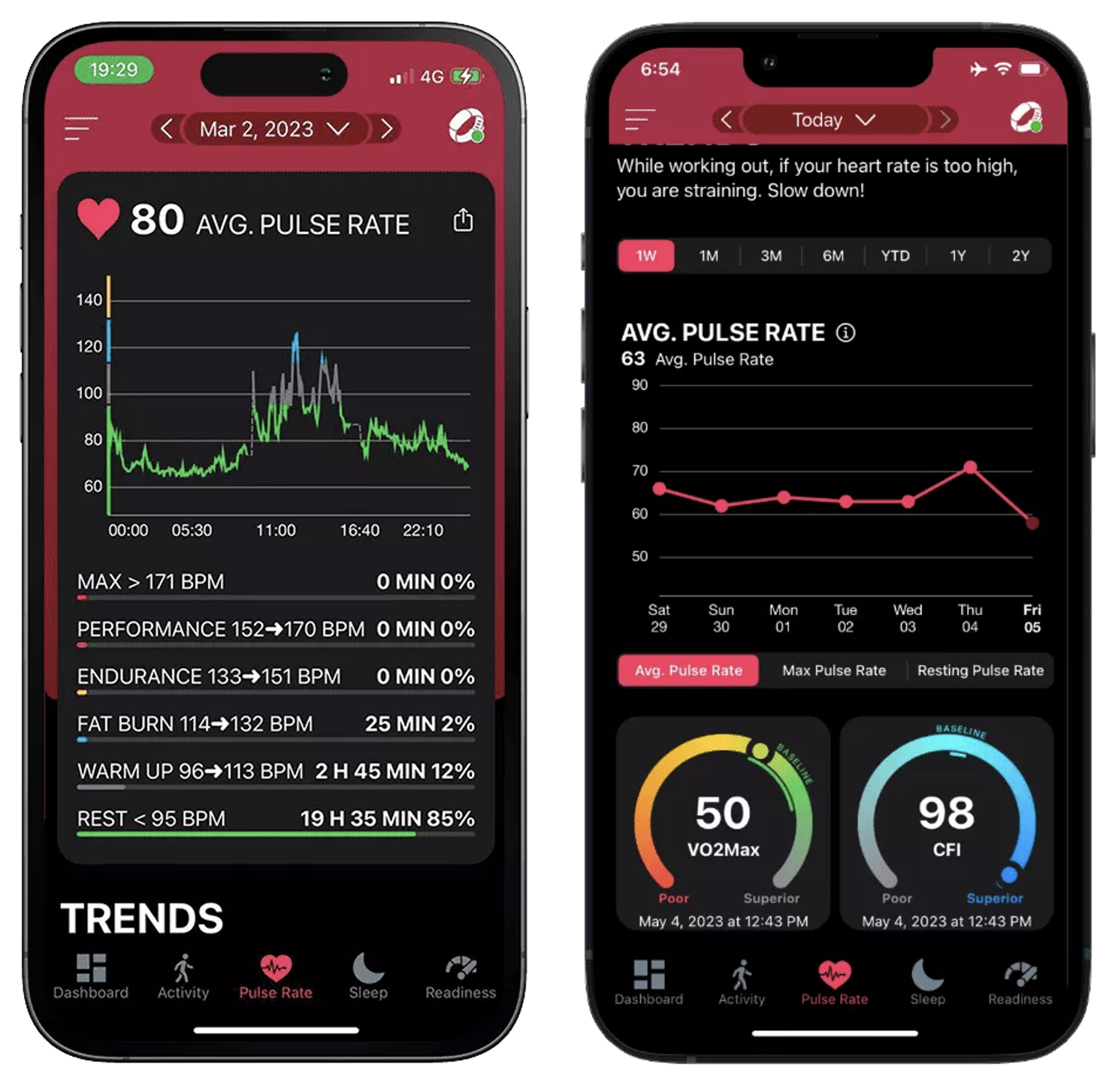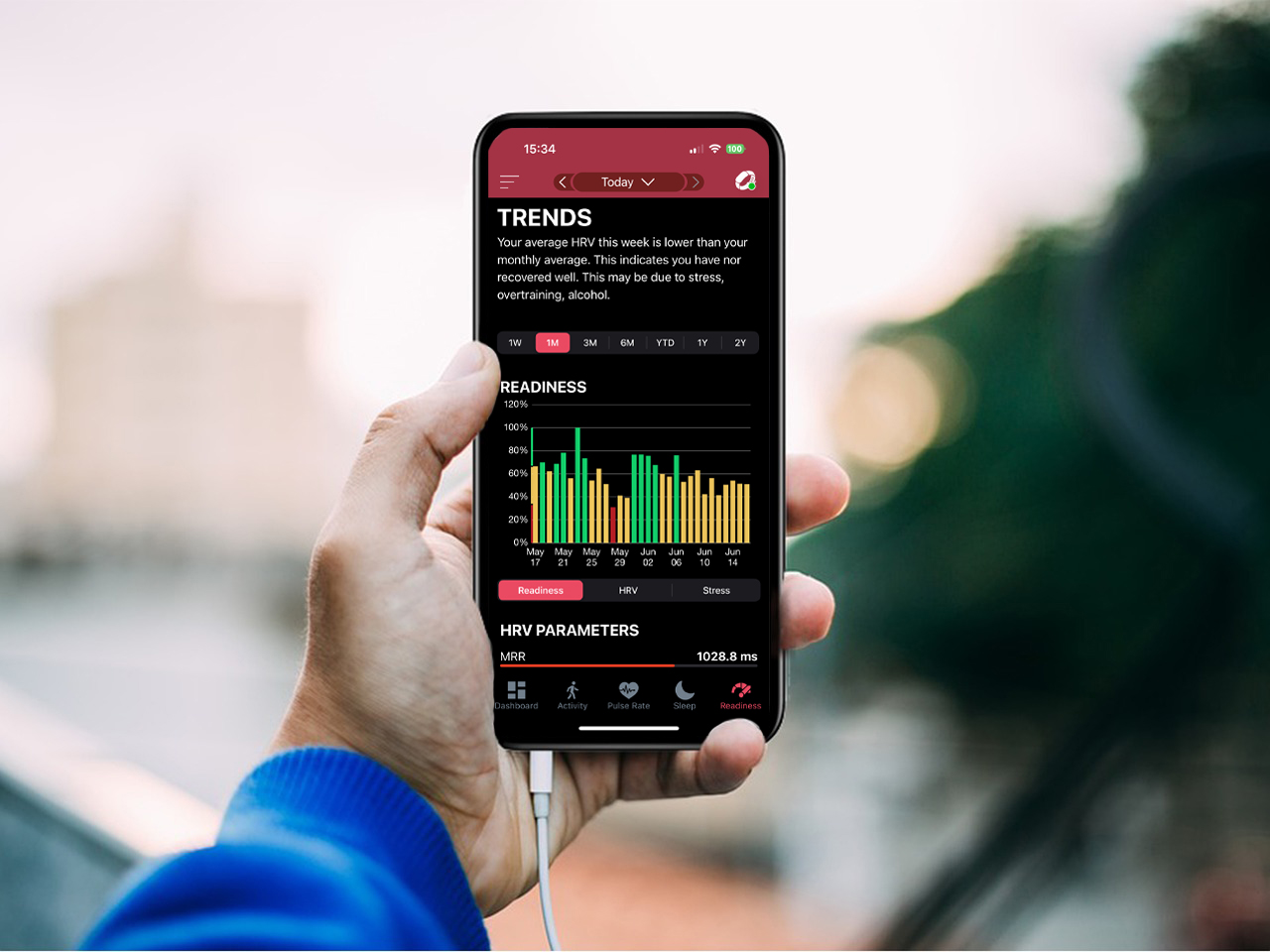Wellness Coaching
Cardiomood for Coaches
Wellness & Lifestyle Coaches can benefit from partnering with Cardiomood in the analysis of physiological data for health and well-being assessment. Cardiomood offers coaches tools for a range of outcome measures based on the analysis of heart rate variability (HRV) and other physiological parameters.
Stress and Recovery
Cardiomood evaluates stress levels and recovery effectiveness by analyzing the balance between sympathetic and parasympathetic nervous system activity. This assessment helps coaches understand their clients response to stress and the efficacy of their recovery periods.
Training Load
Cardiomood calculates the physiological impact of training sessions by analyzing HRV and other relevant variables. This information allows clients to gauge the intensity and strain of their workouts, facilitating optimal training planning and preventing overexertion.
Cardiovascular Fitness
Cardiomood estimates an individual’s cardiovascular fitness and aerobic capacity by assessing their VO2max. This measure helps evaluate the effectiveness of training programs and track improvements in fitness levels over time.

Physical Activity
Cardiomood provides detailed analysis of daily physical activity, including step count, calorie expenditure, and intensity distribution. This information assists clients in understanding their activity patterns and optimizing their daily routines for improved health and well-being.
Sleep Analysis
Cardiomood offers insights into sleep quality and recovery by analyzing HRV and sleep patterns. It evaluates different sleep stages, sleep efficiency, and the balance between restfulness and alertness during the night.
Energy Resources
Cardiomood provides information on an individual’s energy expenditure and the balance between physical activity and recovery. This assessment helps optimize daily routines by identifying periods of high activity and potential imbalances that may affect performance and overall well-being.
Actionable Insights
Coaches typically use the Cardiomood Bracelet that captures their client’s physiological data, such as heart rate, HRV, Sleep and Activity. Cardiomood’s analysis algorithms then process the data to provide actionable insights and recommendations for coaches and their clients.
Stress Management
Based on the analysis of stress levels and recovery effectiveness, coaches can implement stress management techniques such as deep breathing exercises, meditation, or engaging in activities that promote relaxation and well-being.
Optimal Training Planning
By understanding the physiological impact of training sessions and the individual’s training load, coaches can adjust their workout intensity, duration, and frequency to optimize their training plan. This helps in preventing overtraining and reducing the risk of injuries.
Fitness Improvement
Tracking cardiovascular fitness measures like VO2max enables coaches to set goals and monitor their progress. They can adjust their training programs accordingly, gradually increasing the intensity and duration of workouts to improve their fitness levels.
Activity Optimization
Analyzing daily physical activity patterns helps coaches identify periods of low activity or sedentary behavior. They can make conscious efforts to incorporate more movement into their routine, such as taking regular breaks from sitting, engaging in active hobbies, or incorporating structured exercise sessions.
Sleep Quality Enhancement
Sleep analysis provides insights into sleep patterns and efficiency. Coaches can make adjustments to their clients sleep routine, such as maintaining a consistent sleep schedule, creating a relaxing sleep environment, and adopting good sleep hygiene practices to improve sleep quality and enhance overall recovery.
Balancing Energy Expenditure
Understanding energy expenditure and the balance between physical activity and recovery helps coaches identify potential imbalances. They can ensure they have adequate rest and recovery periods to prevent exhaustion and optimize their clients overall energy levels.

Lifestyle Modifications
The analysis of outcome measures can provide valuable insights into overall health and well-being. Coaches can make informed decisions about their clients lifestyle choices, such as incorporating healthier dietary habits, managing work-life balance, and prioritizing self-care practices.
Goal Setting and Tracking
Outcome measures offer coaches the ability to set specific health and fitness goals and track their clients progress over time. Regularly monitoring and reassessing these goals can help clients stay motivated and make necessary adjustments to their clients routines as they work towards achieving their clients objectives.
Utilize Cardiomood
The bracelet monitor offers flexibility to set data collection intervals by minute, by second or 25Hz, 32Hz and 128Hz. We measure Heart Rate, RR intervals, Breathing Rate, A-Fib detection, SpO2, Core Body Temperature, ECG, Activity and Sleep. Here’s how you can incorporate Cardiomood’s tools into your coaching

Assess Clients Needs
During your coaching sessions, discuss your clients’ goals, challenges, and areas of focus. Identify if any of Cardiomood’s outcome measures can provide valuable insights related to their clients well-being, stress management, fitness, physical activity, or sleep patterns.
Educate Clients about the Benefits
Explain to your clients how Cardiomood’s tools can complement their clients coaching journey. Highlight the benefits of using physiological data analysis to gain deeper insights into their clients overall health, optimize training, manage stress, enhance recovery, and improve well-being.
Recommend Data Collection
Encourage your clients to collect relevant physiological data using wearable devices that capture heart rate variability (HRV) and other relevant parameters. Help them understand the importance of consistent data collection and guide them on choosing the right devices that are compatible with Cardiomood’s analysis.
Interpret and Discuss Results
Once the data is collected and analyzed using Cardiomood’s tools, assist your clients in interpreting the results. Discuss the insights and recommendations provided by Cardiomood, helping them understand the implications for their health, fitness, stress management, and sleep patterns.
Incorporate Insights into Coaching Strategies
Utilize the insights gained from Cardiomood’s tools to tailor your coaching strategies. Adjust training plans based on training load analysis, recommend stress management techniques based on stress and recovery assessments, or advise on optimizing physical activity and sleep patterns.
Monitor Progress
Continuously monitor your clients’ progress by periodically reviewing the data and results provided by Cardiomood’s tools. Track improvements in fitness levels, stress management, and sleep quality over time. Use this information to provide further guidance and support.
Success Stories
Meet Michael, founder of the London Stress Center and wellness coach, who leverages Cardiomood’s tools to provide personalized wellness coaching to his clients. Michael understands the impact of stress on overall well-being and uses Cardiomood’s analysis to optimize his coaching approach. Here’s how he incorporates Cardiomood into his wellness coaching sessions
Wellness Evaluation
Michael conducts an in-depth assessment to understand his clients’ wellness goals and stress levels. He introduces Cardiomood’s tools, emphasizing their ability to provide valuable insights into stress and recovery patterns.
Physiological Data Collection
Michael guides his clients in collecting physiological data using wearable devices compatible with Cardiomood’s analysis. He encourages them to track their heart rate variability (HRV), sleep patterns, and activity levels.
Data Analysis and Interpretation
Using Cardiomood’s tools, Michael analyzes the collected data to gain insights into his clients’ stress levels, recovery effectiveness, and sleep quality. He interprets the results to identify patterns and triggers that contribute to their stress levels.
Stress Management Techniques
Based on the data analysis, Michael develops personalized stress management techniques tailored to each clients specific needs. He incorporates relaxation techniques, mindfulness practices, and breathing exercises to help clients effectively manage and reduce their stress levels.
Sleep Optimization Strategies
By analyzing sleep data, Michael identifies areas for improvement in sleep quality and develops strategies to optimize sleep patterns. He provides recommendations on sleep hygiene practices, creating a sleep-friendly environment, and establishing a consistent sleep routine.
Energy Management and Work-Life Balance
Michael utilizes Cardiomood’s analysis of energy balance to assist clients in managing their energy levels and achieving a healthy work-life balance. He helps them identify strategies for prioritizing self-care, setting boundaries, and incorporating activities that replenish their energy.
Coaching and Support
Michael offers ongoing coaching and support throughout the wellness journey. He regularly reviews and discusses the data analysis results with clients, providing guidance, motivation, and accountability. He adjusts coaching strategies based on the evolving needs and progress of each client.
Progress Tracking and Goal Setting
Michael helps clients track their progress by regularly monitoring the data analysis results provided by Cardiomood. He collaborates with clients to set achievable wellness goals and celebrates milestones along the way.





